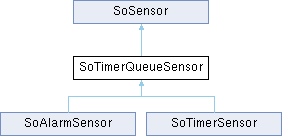 |
Coin
4.0.3
Coin3D core library
|
 |
Coin
4.0.3
Coin3D core library
|
The SoTimerQueueSensor class is the abstract base class for sensors triggering on certain timer events. More...
#include <Inventor/sensors/SoTimerQueueSensor.h>

Public Member Functions | |
| SoTimerQueueSensor (SoSensorCB *func, void *data) | |
| SoTimerQueueSensor (void) | |
| virtual | ~SoTimerQueueSensor (void) |
| const SbTime & | getTriggerTime (void) const |
| virtual SbBool | isScheduled (void) const |
| virtual void | schedule (void) |
| virtual void | trigger (void) |
| virtual void | unschedule (void) |
 Public Member Functions inherited from SoSensor Public Member Functions inherited from SoSensor | |
| SoSensor (SoSensorCB *func, void *data) | |
| SoSensor (void) | |
| virtual | ~SoSensor (void) |
| void * | getData (void) const |
| SoSensorCBPtr | getFunction (void) const |
| SoSensor * | getNextInQueue (void) const |
| void | setData (void *callbackdata) |
| void | setFunction (SoSensorCB *callbackfunction) |
| void | setNextInQueue (SoSensor *next) |
Protected Member Functions | |
| void | setTriggerTime (const SbTime &time) |
Protected Attributes | |
| SbBool | scheduled |
 Protected Attributes inherited from SoSensor Protected Attributes inherited from SoSensor | |
| SoSensorCB * | func |
| void * | funcData |
Additional Inherited Members | |
 Static Public Member Functions inherited from SoSensor Static Public Member Functions inherited from SoSensor | |
| static void | initClass (void) |
The SoTimerQueueSensor class is the abstract base class for sensors triggering on certain timer events.
Timer sensors triggers upon specific points in time.
This class is an abstract superclass which collects the common interface of the various non-abstract timer sensor classes. See the documentation of the subclasses for information on what ways there are to specify base times, intervals, alarm-style single triggering, repeated triggers, etc.
Note that Coin timer sensors should in no way be considered "hard real time". That is, you cannot expect a timer to always trigger at the exact moment it was set up for. Delays in triggering could be due to other activities in Coin, a task suspended, or heavy load from other applications on the system. These situations could all cause the processing of sensor queues (from SoQt / SoWin / SoXt / whatever) to be slightly delayed, thereby causing delays in timer sensor triggering.
On modern systems, a timer will usually trigger within a few milliseconds of its designated time, though.
If a timer sensor cannot trigger at the exact moment it has been scheduled, it will be triggered at the first opportunity after the scheduled time has passed.
Here's a simple usage example. It's a standalone example, which only demonstrates how to set up a repeating timer sensor with a callback:
| SoTimerQueueSensor::SoTimerQueueSensor | ( | void | ) |
Default constructor.
| SoTimerQueueSensor::SoTimerQueueSensor | ( | SoSensorCB * | func, |
| void * | data ) |
Constructor taking as arguments the sensor callback function and the userdata which will be passed the callback.
|
virtual |
Destructor.
Returns the time at which the sensor will trigger.
|
virtual |
Check if this sensor is scheduled for triggering.
Implements SoSensor.
Put the sensor in the global timer queue.
Implements SoSensor.
Reimplemented in SoAlarmSensor, and SoTimerSensor.
Set absolute time at which to trigger the sensor.
Trigger the sensor's callback function.
Reimplemented from SoSensor.
Remove sensor from the timer queue, without triggering it first.
Implements SoSensor.
Reimplemented in SoTimerSensor.
|
protected |
TRUE if the sensor is currently scheduled.